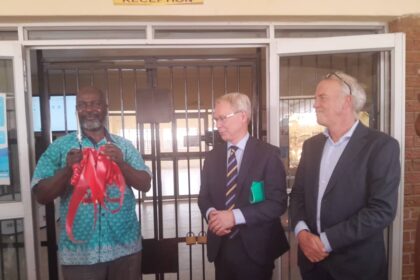By Nokuthaba Dlamini (ne**@th****************.zw)
NKAYI (The Citizen Bulletin) — Onesimo Dube (11) from Manomano village in Nkayi has a heart condition that makes her breathing difficult, of late she cannot access health care services because of the ongoing national lockdown to control the spread of COVID-19.
The heart condition, according to her widowed mother Emma Dlomo has forced her daughter to drop out of school as the condition has been worsening since she turned eight years old.
Dlomo says her daughter’s breathing problems were diagnosed at Mpilo Central Hospital upon birth in 2010 and she could not get proper treatment. Doctors said she had a small heart—an ailment which affects breathing.
“They rushed me to Bulawayo from Nkayi District Hospital during labour and at birth. She couldn’t breathe properly, and the doctors said I should organize funds to take her to India or South Africa for heart surgery,” Dlomo said.
“I have been supplementing her with some pills to prevent clotting and infection around her heart, but because of this lockdown l could not take her to hospital for assessment or her monthly prescriptions and she keeps worsening.”
Dlomo says her daughter’s condition has not only forced her to drop out of school, but has also made her not to mingle with other children as she is often ill.
Onesimo has had to drop out of school because of the gravity of her illness.
“I tried to take her to hospital a fortnight ago, but we could not get a bus or lifts to the main hospital in Nkayi. So I have resorted to traditional concoctions.”
The unemployed widow fears her daughter will might not make it, particularly on days when she has multiple convulsions and collapses. Besides COVID-19 induced restrictions to accessing hospitals, the health facilities hardly have medication for Onesimo’s condition.
At only 11 years, Onesimo is in a dire situation, but she is not alone.
Seven months old Dumiso Sibanda from Singwangombe village has a similar heart condition to Onesimo and has received no medical care.
His teenage mother, Portia Ndlovu (15) says her son often struggles to breathe.
“I started noticing this problem when he was born, but because l delivered from home due to lockdown restrictions, I could not take him to hospital for immunisation until in September when I went to our local clinic where they immunised him before advising me to take him to the main hospital in Nkayi for his heart check-up,” she says.
Ndlovu’s son, because of the condition, is underweight.
“He hardly feeds and often cries, especially when he is breast feeding. He is underweight and l have no supplements, so I am just hoping that once the lockdown restrictions are reduced and buses are available, I may be able to take him to hospital for examination.”
According to a recent report by the Zimbabwe Statistical Agency (ZIMSTAT), together with the World Bank and UNICEF, on socio-economic effects of COVID-19 in Zimbabwe, most of the urban and rural population in the country have had no access to health.
The report notes that 50 percent of the respondents said they could not get medical treatment from the month of April to November last year. The majority reported lack of money as the reason for being unable to get medical treatment. In rural areas, a tenth of those unable to get medical treatment cited lack of medical personnel as the reason.
Medical Doctor and Public Health expert, Norman Matara, says the COVID-19 pandemic has drastically affected the availability and quality of health services in most public and private institutions.
“For example, patients with chronic diseases such as cardiovascular conditions have been reported to be missing their routine appointments for medical check-ups,” Matara says.
“Some health institutions are insisting on COVID-19 test results before admissions, resulting in limited access to services amongst patients who do not have adequate finances. The health system has not been spared either as human resources and supply chains for medical sundries are to be reallocated to the increasing disease burden posed by COVID-19.”
To counter the challenge, Matabeleland North Province Medical Director Munekayi Padingani says they are planning to conduct integrated services for patients with chronic illnesses at ward level.
“Right now, we have no funding, but what we have been doing are visits of our patients within their communities for them to get examined at the time of lockdown,” Padingani says.
“We send teams to meet these people at various places even in schools and we have managed to help a majority of them, but for now the issue of funding has been a stumbling block.”
On expecting mothers, Padingani says they need to arrange transport to camp in their respective delivery health centres weeks earlier.
“They need close monitoring so we would like to urge them to visit our district’s main dormitories before going into labour for their safety and their unborn baby’s life.”
According to the latest World Health Organisation (WHO), data published in 2018 coronary heart disease deaths in Zimbabwe reached 5 896 or 4.96% of total deaths.
Matara has urged the government to ensure continuity of quality care to all patients with chronic conditions such as cardiovascular disease, diabetes, asthma or epilepsy during this pandemic.
He also says adequate infection prevention and control mechanisms should also be in place to ensure the minimal transmission of COVID-19 to these patient subgroups during visits to health institutions. #OpenCovidContract #WhereAreOurVaccinesZW
This article was originally published by The Citizen Bulletin, a non-profit news organization that produces hard-hitting, hyperlocal reporting and analysis for the southwestern region of Matabeleland.
COVID-19: Children with chronic ailments suffer in Nkayi



